- Home
- Martin Cruz Smith
Gorky Park Page 5
Gorky Park Read online
Page 5
‘Coup de grace. Very neat.’ Pasha approved.
‘More noise,’ Fet flushed. ‘I don’t care what you say, that’s a lot of noise. Anyway, shooting someone in the mouth is no coup de grace.’
‘Detective’ – Arkady swung his finger back – ‘you’re right. So I’m shooting you for another reason, a good reason to take the chance of firing two more times.’
‘What is it?’ Pasha asked.
‘I wish I knew. Now I take out my knife and cut off your faces. Probably used shears on your fingers. Put everything back in the bag.’
‘You used an automatic.’ Pasha was inspired. ‘Less noise than a revolver, and the shells are ejected right into the bag. That’s why we didn’t find any in the snow.’
‘Time of day?’ Arkady urged.
‘Late,’ Pasha said. ‘So there’s less chance of other skaters stopping at the clearing. Maybe snowing – that would muffle the shots even more. When wasn’t it snowing this winter? So it’s dark and snowing when you come out of the park.’
‘And less likely anyone sees me toss the bag in the river.’
‘Right!’ Pasha clapped.
Fet sat on the chair. ‘The river was frozen,’ he said.
‘Fuck!’ Pasha’s hands fell.
‘Let’s go eat,’ Arkady said. For the first time in two days he had an appetite.
The cafeteria at the metro stop across the street kept a table available for investigators. Arkady had whitefish, cucumber in sour cream, potato salad, bread and beer. Old Belov joined the group and started on war stories about Arkady’s father.
‘This was early on, before we’d regrouped.’ Belov gave a rheumy wink. ‘I was the general’s driver in a BA-20.’
Arkady remembered the story. The BA-20 was an antique armored car consisting of a mosque-shaped machine-gun turret on a Ford chassis. His father’s command of three BA-20s were trapped one hundred kilometers behind German lines during the first month of the war and escaped with the ears and epaulets of an SS group commander.
It was funny about the ears. Russians accepted rape and slaughter as the normal sideshows of war. They happily believed Americans took scalps and Germans ate children. What made a nation of worldshaking revolutionaries recoil in horror was the idea of a human trophy taken by a Russian. It was worse than horrible; to the invincible yet slightly anxious proletariat it showed the one stain darker than all others: lack of culture. The rumor about the ears dogged the general’s career after the war.
‘The rumor about the ears is untrue,’ Belov assured the table.
Arkady remembered the ears. They used to hang like shriveled pastries on the wall of his father’s study.
‘You really want me to talk to all those vendors?’ Pasha rolled a cold cut on his fork. ‘All they say is they want us to chase the Gypsies from the park.’
‘Talk to the Gypsies, too. We have a time now, the beginning of February,’ Arkady said. ‘And find out about the skating music they play over the loudspeakers.’
‘Do you see your father the general often?’ Fet broke in to ask.
‘Not often.’
‘I think about those poor bastards at the militia station in the park,’ Pasha said. ‘Nice little station – regular log cabin, warm stove, everything. No wonder they didn’t know the woods were full of bodies. They’ll see lots of woods at their next station, and polar bears and Eskimos too.’
Belov and Fet caught Arkady’s attention. To his surprise, these soulmates were vigorously disparaging the Cult of Personality.
‘You mean Comrade Stalin?’ he asked.
Fet blanched. ‘We mean Olga Korbut.’
Chuchin arrived. The chief investigator for Special Cases was a composite of the most ordinary features, a stencil of a man. He told Arkady that Lyudin had called with a name from the skates.
Above the drabness of Moscow, on the brow of Lenin Hills, was Mosfilm studio. There were other studios in the country: Lenfilm, Tadjifilm, Uzbekfilm. None was as large as Mosfilm or as prestigious. A visiting dignitary would be carried by limousine along the compound’s pastel orange wall, through the gatehouse, left toward a garden and a sharp right to the main door of the central film pavilion, where administrators, famous directors (always with heavy glasses and cigarettes) and amenable actresses with flowers lined up to greet him. He would be surrounded by many more huge pavilions, each housing sets, screening buildings, writers’ buildings, administrators’ buildings, set-design hangars, developing labs and warehouses and prop lots of Tartar wagons, panzer tanks and spaceships. It was a city in itself, with its own burgeoning population of technicians, artists, censors and extras – an extraordinary number of extras because of a penchant of Soviet films for crowd scenes, because no hard budget Soviet films could afford crowds, and because for many young people gaining an actor’s pass to Mosfilm even as an extra was to be born again.
No dignitary and uninvited, Arkady found his own way between the central pavilion and the piles of snow dumped in front of the administration building. A glowering girl held up a chalkboard sign that demanded ‘Quiet!’ He found he had arrived at an outdoor set, a garden of potted apple trees sunk into sod and lit by filtered floodlights with the warm glow of an autumn sunset. A man in foppish, nineteenth-century clothes perused a book at a white wrought-iron table in the garden. Behind him was a false wall with an open window that revealed a gas lamp on a piano. A second man in rough clothes and a cap tiptoed along the wall, drew a long-barreled revolver and aimed.
‘My God!’ The reader jumped up.
Something was wrong, something always seemed to be wrong, and they kept reshooting the scene. The director and cameramen, in foul moods and stylish leather jackets, swore at the production assistants, who were pretty girls in Afghan coats. They all displayed a mixture of boredom and tension. The crowd was interested. Anyone in the immediate vicinity with nothing better to do – electricians, chauffeurs, Mongols in bodypaint, little ballerinas as timid as overbred dogs – watched in rapt silence at the drama of filming, so much more interesting than the drama that was being filmed.
‘My God! You frightened me!’ the reader tried again.
Standing as inconspicuously as possible by the generator truck that powered the lights, Arkady had ample time to find the wardrobe assistant. She was tall, had dark eyes, fair skin and brown hair drawn back in a bun. Her Afghan coat was shabbier than the other girls’ and short, revealing her wrists. Standing motionless, holding a script, she had the stillness of a photograph. As if she felt Arkady’s eyes, she looked toward him, and her gaze gave him the sense of being momentarily illuminated. She turned her attention back to the scene in the garden, but not before he’d seen the mark on her right cheek. In the militia picture the mark was gray. He saw now that it was a blue discoloration, small but striking because she was beautiful.
‘My God! You frightened me!’ The reader blinked at the leveled revolver. ‘I’m nervous enough as it is, and you pull a stupid trick like that!’
‘Lunch!’ the director called, and walked off the set. This scene, too, had been played before, for the cast and crew decamped almost as quickly, leaving the onlookers to disperse. Arkady watched the wardrobe assistant place dustcloths over the garden table and chairs, pull up a wilting flower and turn down the gas lamp on the piano. Her coat was worse than shabby; patches had turned Afghan embroidery into a crazy quilt. A cheap orange scarf was tied loosely at her neck. Her boots were red vinyl. A remarkable ensemble, yet she carried it off with such self-possession that another female seeing her might say, Yes, that’s how I should dress, right out of a trash can. Without floodlights the garden was overcast. She wore a smile.
‘Irina Asanova?’ Arkady asked.
‘And you?’ She had a low voice rounded by a Siberian accent. ‘I know all my friends, and I’m sure I don’t know you.’
‘You seem to know you’re the one I came to talk to.’
‘You aren’t the first one to bother me when I’m at work.’ All this w
as said with her smile, as if no offense could be taken. ‘I’ll miss lunch,’ she sighed, ‘so I’ll diet. Do you have a smoke?’
A few curls of hair had escaped from the discipline of her bun. Irina Asanova was twenty-one, Arkady remembered from the militia file. When he lit the cigarette for her, she cupped the flame in his hand with her long, cool fingers. The sexual touch was such a ploy that he was disappointed, until he saw in her eyes she was laughing at him. They were such expressive eyes, they would have made the homeliest girl interesting.
‘Men from Special Cases usually have better cigarettes, I must inform you of that,’ she said, and inhaled greedily. ‘Is this part of a campaign to get me fired? If you chase me from here, I’ll just get another job.’
‘I’m not from Special Cases or the KGB. Here.’ Arkady showed his ID.
‘Different, but not very different.’ She handed it back. ‘What does Chief Investigator Renko want with me?’
‘We found your ice skates.’
It took her a moment to understand. ‘My skates!’ She laughed. ‘You actually found them? I lost them months ago.’
‘We found them on a dead person.’
‘Good! Serves them right. There is justice, after all. I hope they froze to death. Please, don’t be shocked. Do you know how long it took me to save for those skates? Look at my boots. Go ahead, look at them.’
He saw that her red boots were splitting from the zippers. Suddenly Irina Asanova was leaning on his shoulder and pulling one boot off. She had long, graceful legs.
‘Not even an insole.’ She rubbed her bare toes. ‘You saw the director of this film? He promised me a pair of fur-lined Italian boots if I slept with him. Do you think I should?’
It seemed a real question. ‘Winter’s almost over,’ he said.
‘Exactly.’ She slipped her boot back on.
What impressed Arkady, besides her legs, was how she managed her whole performance with such indifference, as if she didn’t care what she said or did.
‘Dead,’ she said. ‘I feel better already. I reported the skates stolen, you know, at the rink and to the militia.’
‘Actually, you reported them missing on February fourth, though you said you’d lost them on January thirty-first. You didn’t know you’d lost them for four days?’
‘Isn’t that generally when you find out you’ve lost something, when you want to use it again? Even you, Investigator? It took me a while to figure out where I’d lost them – then I ran back to the rink. Too late.’
‘Maybe in the meantime you’ve remembered something or someone at the rink that you didn’t mention to the militia when you reported the skates stolen. Do you have any idea who could have taken your skates?’
‘I suspect’ – she paused for comic effect – ‘everyone.’
‘So do I,’ Arkady said seriously.
‘We have something in common.’ She laughed with delight. ‘Imagine!’
But as soon as he began to laugh with her she cut him dead. ‘A chief investigator doesn’t come to tell me about skates,’ she said. ‘I told the militia everything I knew back then. What do you want?’
‘The girl wearing your skates was killed. Two others were found with her.’
‘What has that to do with me?’
‘I thought you might be able to help.’
‘If they’re dead, I can’t help them. Believe me, there’s nothing I’ll do for you. I’ve been a law student. If you’re going to arrest me, you have to have a militiaman with you. Are you going to arrest me?’
‘No—’
‘Then unless you want to lose me my job, you’ll leave. People here are afraid of you, they don’t want to see you around. You won’t come again, will you?’
Arkady was astonished at himself for letting this ridiculous girl act up. On the other hand, he understood how it was with students who got thrown out of the university and then hung on to any job they could get so they wouldn’t lose their Moscow permit and be shipped home. All the way to Siberia for this one.
‘No,’ he agreed.
‘Thank you.’ Her solemn gaze turned practical. ‘Before you go, could you give me another smoke?’
‘Have the pack.’
The film crew drifted back to the set. The actor with the revolver was drunk, and aimed it at Arkady. Irina Asanova called after the departing investigator, ‘By the way, what did you think of the scene?’
‘Like Chekhov,’ he answered over his shoulder, ‘but bad.’
‘It is Chekhov,’ she said, ‘and it stinks. You’re not missing a thing.’
Levin was studying a chessboard when Arkady entered the pathologist’s office.
‘I will give you a concise history of our Revolution.’ Levin didn’t look up from the black and white pieces. ‘Once a man indulges himself in murder, in time he thinks nothing of robbing, and from robbing he comes next to foul language and atheism, and from these to opening doors without knocking. Black’s move.’
‘Do you mind?’ Arkady asked.
‘Go ahead.’
Arkady swept the center of the board clean and placed three black pawns there on their sides. ‘Beauty and Beast and Red.’
‘What are you doing?’ Levin viewed the havoc of his game.
‘I think you missed something.’
‘How would you know?’
‘Just let me go through this. Three victims, all killed with one shot through the chest.’
‘Two shot through the head as well, so how do you know which shots came first?’
‘The killer has planned carefully,’ Arkady plunged on. ‘He removes identification papers, cleans the pockets of his victims, actually flays their faces and cuts off the ends of their fingers to eliminate points of identification. However, he takes the added chance of firing two more bullets into the faces of the male victims.’
‘To make sure they’re dead.’
‘He knows they’re dead. No, on one man there is another point of identification to erase.’
‘Maybe he shot them in the head first, then the heart.’
‘Then why not the girl as well? No, he shoots one dead man in the face, then realizes he is only announcing what he’s up to, and so shoots the second dead man as well.’
‘Then I ask you’ – Levin stood – ‘why not the girl as well?’
‘I don’t know.’
‘And I tell you as an expert, which you are not, that a bullet of that caliber won’t create so much disfigurement that the men couldn’t be identified. Besides, this butcher had already taken their faces off.’
‘Tell me as an expert, what did the bullets achieve?’
‘If the two men were already dead’ – Levin folded his arms – ‘local destruction mainly. The teeth, which we’ve already gone over.’
Arkady said nothing. Levin jerked open a drawer and brought out boxes marked GP1 and GP2. From box GP1, he poured two nearly whole incisors into his hand.
‘Good teeth,’ Levin said. ‘You could crack nuts with these.’
The teeth in box GP2 hadn’t fared as well. One shattered incisor and a separate packet of shards and powder.
‘Most of one tooth was lost in the snow. However, what we analyzed shows enamel, dentin, cementum, dehydrated pulp, tobacco stain and lead traces.’
‘A filling?’ Arkady asked.
‘ “Nine grams.” ’ Levin used slang for a bullet. ‘Satisfied?’
‘This was Red, the boy who dyed his hair, wasn’t it?’
‘GP2 for God’s sake!’
Red was downstairs in a cool metal drawer. They wheeled the body into the autopsy room, Arkady puffing on a cigarette.
‘Give me some light.’ Levin elbowed him back. ‘I thought you hated this work.’
The center of the upper jaw was a hole framed by brown secondary incisors. With a pick, Levin prodded bits of the jaw onto a damp glass slide. When deposits covered the slide, he marched to a microscope on a worktable.
‘Do you ever know what you’re loo
king for, or do you simply guess?’ he asked Arkady.
‘I guess, but nobody robs an empty safe.’
‘Whatever that means.’ The pathologist applied an eye to the microscope while he stirred the broken bone. Starting with an eye-piece of 10X, he rotated the objective lenses. Arkady pulled up a chair and sat with his back to the corpse while Levin removed from the slide one granule of bone at a time.
‘I sent a report to your office that you probably haven’t seen,’ Levin said. ‘The fingertips were clipped off with shears. There is distinct and opposite grooving of the wounds. The facial tissue was not removed with a scalpel, the cuts aren’t that fine – in fact, there’s a heavy scoring of the bone. I’d say a big knife, maybe a hunting knife, and extraordinarily sharp.’ A fine dust remained on the slide. ‘Here, take a look.’
Magnified two hundred times, the dust was an ivory rubble interspersed with pink timber.
‘What is it?’
‘Gutta-percha. The tooth broke up the way it did because it was dead and brittle. He had root-canal work, and the gutta-percha was inserted in place of the root.’
‘I didn’t know that was done.’
‘It isn’t here. Dentists in Europe don’t use gutta-percha, only the Americans.’ Levin sneered at Arkady’s grin. ‘Luck is nothing to be proud of.’
‘I’m not proud.’
Back at Novokuznetskaya, still in his overcoat, Arkady typed:
Report on Gorky Park Homicides.
Pathological analysis of Victim GP2 ascertains remnants of a gutta-percha pin in the upper middle right incisor root canal. The pathologist states this is a technique not characteristic of Soviet or European dentistry. It is usual in the U.S.A.
GP2 is also the victim who disguised himself by dyeing his red hair to brown.
He added his signature and the time, rolled the report out, separated his carbon and carried the original next door as tenderly as a commutation of sentence. Iamskoy was out. Arkady laid the report in the middle of the prosecutor’s desk.
When Pasha returned in the afternoon, the investigator was in his shirt sleeves leafing through a magazine. The detective set down his tape machine and slumped into a chair.

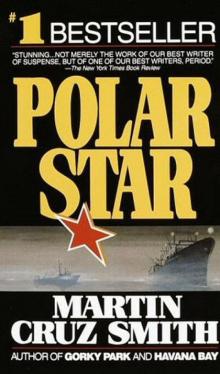 Polar Star
Polar Star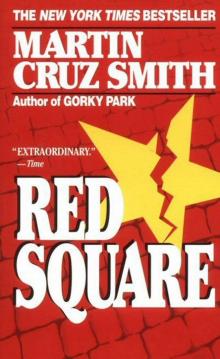 Red Square
Red Square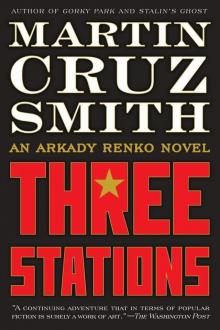 Three Stations
Three Stations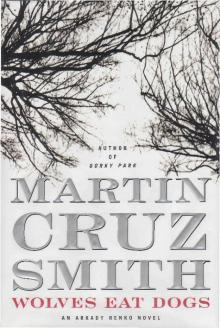 Wolves Eat Dogs
Wolves Eat Dogs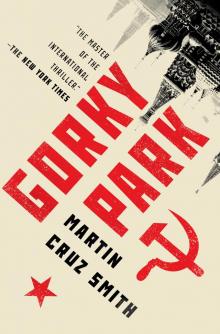 Gorky Park
Gorky Park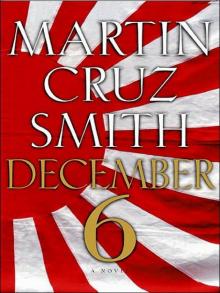 December 6
December 6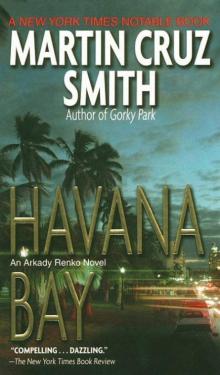 Havana Bay
Havana Bay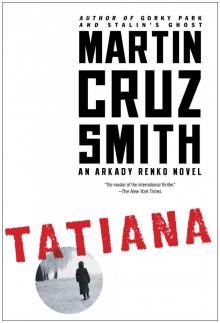 Tatiana
Tatiana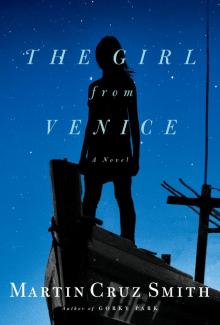 The Girl From Venice
The Girl From Venice Stalin's Ghost
Stalin's Ghost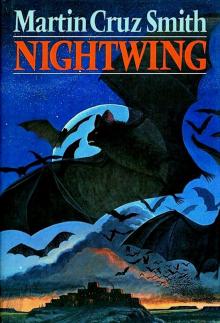 Nightwing
Nightwing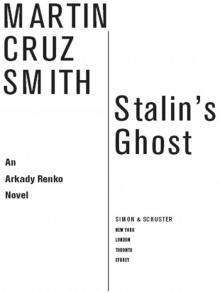 Stalin s Ghost
Stalin s Ghost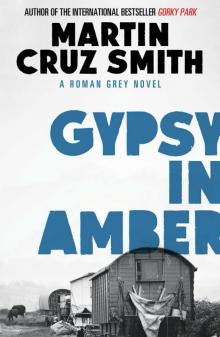 Gypsy in Amber
Gypsy in Amber Rose
Rose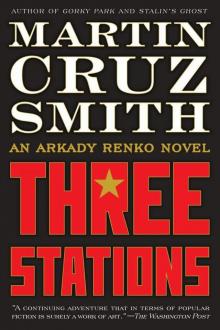 Three Stations: An Arkady Renko Novel
Three Stations: An Arkady Renko Novel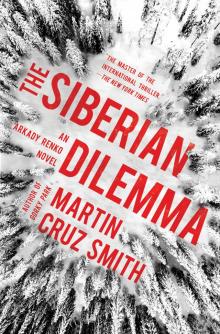 The Siberian Dilemma
The Siberian Dilemma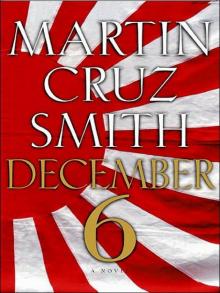 December 6 (V5.0)
December 6 (V5.0)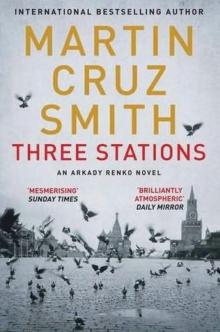 Three Stations ar-7
Three Stations ar-7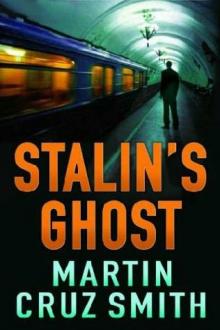 Stalin’s Ghost ar-6
Stalin’s Ghost ar-6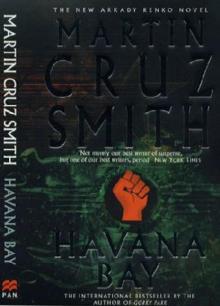 Havana Bay ar-4
Havana Bay ar-4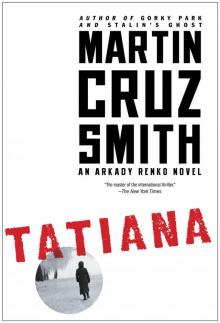 Tatiana ar-8
Tatiana ar-8